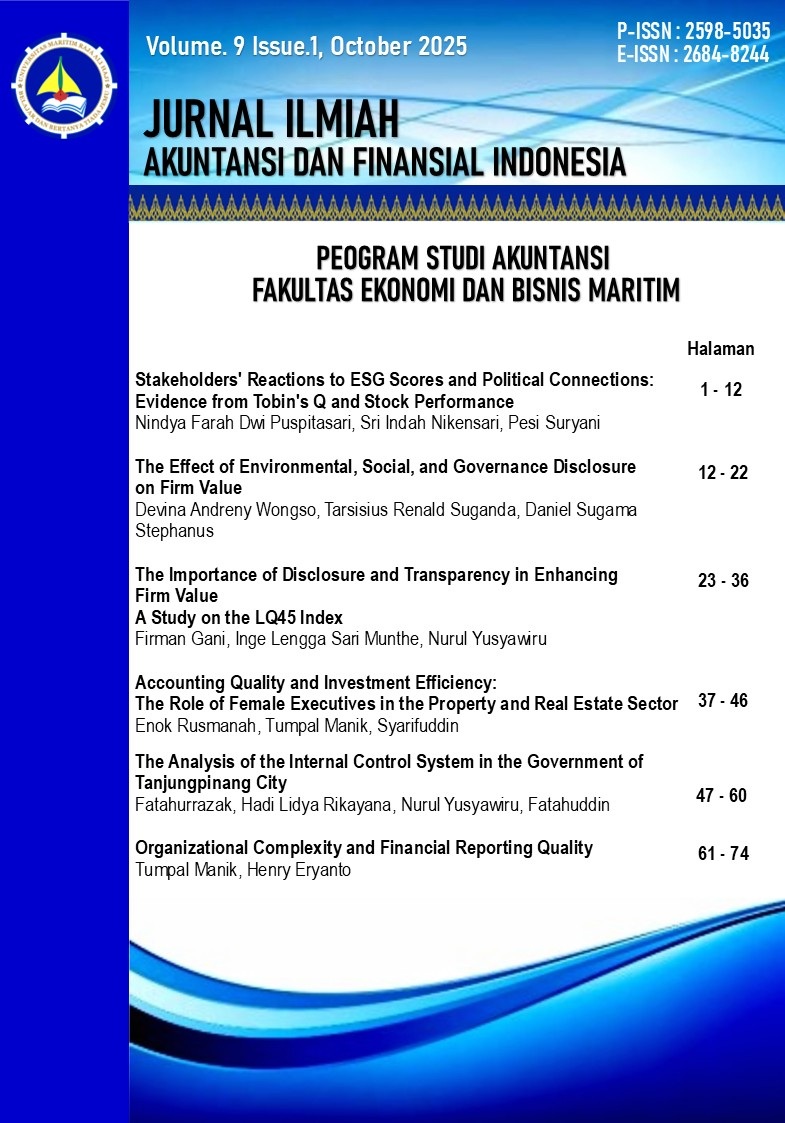Stakeholders' Reactions to ESG Scores and Political Connections: Evidence from Tobin's Q and Stock Performance
DOI:
https://doi.org/10.31629/4chy9t66Keywords:
ESG, political connection, tobins’ qAbstract
This study seeks to determine how environmental, social and governance (ESG) scores and corporate political connections jointly shape stakeholder reactions, captured through firm-level valuation (Tobin’s Q) and stock returns, among Indonesian listed companies. Using firm-level panel data for listed companies over 2020-2023, this quantitative study applies Generalized Least Squares estimation in Stata, and augments the analysis with contextual information drawn from peer-reviewed journals and reputable online sources. Stronger ESG scores raise firm valuations (Tobin’s Q) without enhancing total stock returns, whereas political connections lower Tobin’s Q by about 0.17 yet deliver an average excess return of roughly 0.69 percentage points. The evidence indicates that sustainability credentials and political affiliations influence performance in mutually reinforcing yet distinct ways: stronger ESG scores are associated with durable gains in enterprise value, whereas political connections translate into only short-lived share-price uplifts. Consequently, the findings encourage executives to invest in substantive ESG improvements as a foundation for lasting value creation, while cautioning regulators that the abnormal returns enjoyed by politically connected firms may stem from rent-seeking rather than genuine efficiency.
Downloads
References
Alareeni, B. A., & Hamdan, A. (2020). ESG impact on performance of US S&P 500-listed firms. Corporate Governance (Bingley), 20(7), 1409–1428. https://doi.org/10.1108/CG-06-2020-0258
Alves, R., Krüger, P., & Dijk, M. V. (2025). Drawing up the bill: Are ESG ratings related to stock returns around the world?. Journal of Corporate Finance 93, 102768. https://doi.org/10.1016/j.jcorpfin.2025.102768
Anselmi, G., & Petrella, G. (2025). ESG ratings: Disagreement across providers and effects on stock returns. Journal of International Financial Markets, Institutions and Money, 1000, 102133. https://doi.org/10.1016/j.intfin.2025.102133
Belghitar, Y., Clark, E., & Saeed, A. (2019). Political connections and corporate financial decision making. Review of Quantitative Finance and Accounting, 53(4), 1099–1133. https://doi.org/10.1007/s11156-018-0776-8
Berg, F., Koelbel, J. F., Pavlova, A., Rigobon, R., & Kölbel, J. (2022). ESG Confusion and Stock Returns: Tackling the Problem of Noise (30562; Working Paper Series). https://doi.org/10.3386/w30562
Bernoville, T. (2024). ESG reporting: Your comprehensive guide for 2025. Retrived from https://plana.earth/academy/esg-reporting
Biehl, H., Bleibtreu, C., & Stefani, U. 2024. The real effects of financial reporting: Evidence and suggestions for future research. Journal of International Accounting, Auditing and Taxation 54, 100594. https://doi.org/10.1016/j.intaccaudtax.2023.100594
Boubakri, N., Guedhami, O., Mishra, D., & Saffar, W. (2012). Political connections and the cost of equity capital. Journal of Corporate Finance, 18(3), 541–559. https://doi.org/10.1016/j.jcorpfin.2012.02.005
Chung, K. H., & Pruitt, S. W. (1994). A Simple Approximation of Tobin's Q. Financial Management, 23(3), 70–74. https://doi.org/10.2307/3665623
Demiraj, R., Demiraj, E., & Dsouza, S. (2025). The Moderating Role of Worldwide Governance Indicators on ESG–Firm Performance Relationship: Evidence from Europe. Journal of Risk and Financial Management, 18(4), 213. https://doi.org/10.3390/jrfm18040213
Ernst & Young. (2023). C-suite Insights: Sustainability and ESG Trends Index. Retrieved February 1, 2025, from https://boardagenda.com/resource/ey-c-suite-insights-sustainability-and-esg-trends-index-2023
Fisman, R. (2001). Estimating the Value of Political Connections. The American Economic Review, 91(4), 1095–1102. https://www.jstor.org/stable/2677829
Friede, G., Busch, T., & Bassen, A. (2015). ESG and financial performance: aggregated evidence from more than 2000 empirical studies. Journal of Sustainable Finance and Investment, 5(4), 210–233. https://doi.org/10.1080/20430795.2015.1118917
Hashmi, S. D., Gulzar, S., Ghafoor, Z., & Naz, I. (2020). Sensitivity of firm size measures to practices of corporate finance: evidence from BRICS. Future Business Journal, 6(1). https://doi.org/10.1186/s43093-020-00015-y
International Sustainability Standards Board (ISSB). 2023a. IFRS S1 General Requirements for Disclosure of Sustainability-related Financial Information. Retrieved July 1, 2025, from https://www.ifrs.org/issued-standards/ifrs-sustainability-standards-navigator/ifrs-s1-general-requirements/
International Sustainability Standards Board (ISSB). 2023b. IFRS S2 Climate-related Disclosures. Retrieved July 1, 2025, from https://www.ifrs.org/issued-standards/ifrs-sustainability-standards-navigator/ifrs-s2-climate-related-disclosures
Jamaludin, N., Ismail, S., & Manaf, S. A. (2017). Macroeconomic Variables and Stock Market Returns: Panel Analysis from Selected ASEAN Countries. International Journal of Economics and Financial Issues, 7(1), 37–45. Retrieved from https://www.econjournals.com/index.php/ijefi/article/view/3110
Johnson, S., & Mitton, T. (2003). Cronyism and capital controls: evidence from Malaysia. Journal of Financial Economics, 67, 351–382.
KEY ESG. (2025). 50 sustainability statistics you need to know in 2025. Retrived from https://www.keyesg.com/article/50-esg-statistics-you-need-to-know-in-2024
KPMG International. (2024). The move to mandatory reporting: Survey of Sustainability Reporting 2024. Retrived from https://kpmg.com/xx/en/our-insights/esg/the-move-to-mandatory-reporting.html
Li, X., & Wang, Y. (2024). The effect of political connections on the distribution of firm performance. China Economic Review, 88, 102289. https://doi.org/10.1016/j.chieco.2024.102289
Maaloul, A., Chakroun, R., & Yahyaoui, S. (2018). The effect of political connections on companies’ performance and value: Evidence from Tunisian companies after the revolution. Journal of Accounting in Emerging Economies, 8(2), 185–204. https://doi.org/10.1108/JAEE-12-2016-0105
Melinda, A., & Wardhani, R. (2020). The Effect of Environmental, Social, Governance, and Controversies on Firms’ Value: Evidence from Asia. In W. A. Barnett & B. S. Sergi (Eds.), Advanced issues in the economics of emerging markets (International Symposia in Economic Theory and Econometrics, 27, 147–173). Emerald Publishing Limited. https://doi.org/10.1108/S1571-038620200000027011
Muhammad, M. I., Abubakar, M. N., Kakanda, M. M., & Abubakar, M. A. (2020). The dynamics of capital structure and firm value of listed industrial goods in Nigeria. Asian Journal of Empirical Research, 10(7), 184. https://doi.org/10.18488/journal.1007/2020.10.7/1007.7.184.193
Nadyayani, D. A. D., & Suarjaya, A. A. G. (2021). The Effect Of Profitability On Stock Return. American Journal of Humanities and Social Sciences Research, 5(1), 695–703. Retrieved from https://www.ajhssr.com/wp-content/uploads/2021/01/ZZZC21501695703.pdf
Puspitasari, N. F. D., Simbolon, I. P., & Sari, N. N. (2020). Cost of Equity: Disclosure, Size, and Political Connection. 2nd International Seminar on Business, Economics, Social Science and Technology (ISBEST 2019), 46–53. 10.2991/aebmr.k.200522.010
Simpson, M. W., & Grossmann, A. (2024). The resurrected size effect still sleeps in the (monetary) winter. International Review of Financial Analysis, 92, 103081. https://doi.org/10.1016/j.irfa.2024.103081
Tobin, J., & Brainard, W. C. (1977). Asset Markets and the Cost of Capital. Cowles Foundation Paper 440 (Reprinted from: “Private Values and Public Policy. Essays in Honor of William Fellner”). https://www.researchgate.net/publication/4743481
Wong, W., & Hooy, C. (2018). Do types of political connection affect firm performance differently? Pacific-Basin Finance Journal, 51, 297. https://doi.org/10.1016/j.pacfin.2018.08.009
Zarefar, A., & Armadani, A. (2024). Do Fundamental Financial Ratios Affect The Company’s Stock Price? Indonesia Evidence. Jurnal Akuntansi Dan Keuangan Indonesia, 21(1), 49–63. https://doi.org/10.21002/jaki.2024.03
Downloads
Published
Issue
Section
URN
License
Copyright (c) 2025 Jurnal Ilmiah Akuntansi dan Finansial Indonesia

This work is licensed under a Creative Commons Attribution-NonCommercial 4.0 International License.








